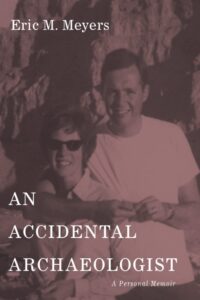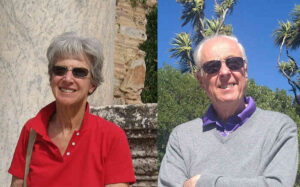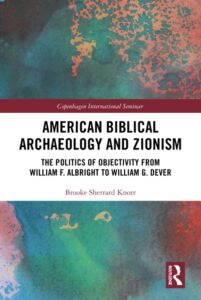MEYERS, E. M. An Accidental Archaeologist: A Personal Memoir. Eugene, OR: Cascade Books, 2022, 232 p. – ISBN 9781666743524.
Este livro de memórias pessoais e profissionais relata os anos de formação do autor e as influências familiares que o impulsionaram. A experiência do anti-semitismo na escola primária e na faculdade desempenhou um papel importante. A centralidade da música e da família foram especialmente influentes. Sua parceria com Carol Meyers permitiu que ele tivesse uma carreira de sucesso na arqueologia acadêmica e no ensino da Duke University. Outros empreendimentos, no entanto, o mantiveram com os pés no chão e focado em assuntos cotidianos: canto, golfe, ativismo social, ensino e escrita. Mas foi o ensino, acima de tudo, que imbuiu sua vida de significado especial, pois tanto o aluno quanto o professor confrontaram as riquezas do passado em busca de um futuro melhor.
escola primária e na faculdade desempenhou um papel importante. A centralidade da música e da família foram especialmente influentes. Sua parceria com Carol Meyers permitiu que ele tivesse uma carreira de sucesso na arqueologia acadêmica e no ensino da Duke University. Outros empreendimentos, no entanto, o mantiveram com os pés no chão e focado em assuntos cotidianos: canto, golfe, ativismo social, ensino e escrita. Mas foi o ensino, acima de tudo, que imbuiu sua vida de significado especial, pois tanto o aluno quanto o professor confrontaram as riquezas do passado em busca de um futuro melhor.
Eric M. Meyers é professor emérito Bernice e Morton Lerner de estudos religiosos e judaicos na Duke University, USA. Ele fundou o Centro de Estudos Judaicos em Duke em 1972. Ele foi coautor com sua esposa, Carol Meyers, de comentários sobre Ageu e Zacarias na Anchor Bible e atuou como editor-chefe da The Oxford Encyclopedia of Archaeology in the Near East. Suas escavações em Séforis foram totalmente publicadas em 2018. Ele também serviu três mandatos como presidente da American Schools/Society of Overseas Research.
This personal and professional memoir recounts the author’s formative years and the family influences that propelled him forward. The experience of anti-Semitism in grammar school and college played a major role. The centrality of music and family were especially influential. His partnership with Carol Meyers allowed him to have a successful career in academic archaeology and in teaching at Duke University. Other endeavors, however, kept  him grounded and focused on everyday matters: singing, golf, social activism, teaching, and writing. But it was teaching most of all that imbued his life with special meaning as both student and teacher confronted the riches of the past in a search for a better future.
him grounded and focused on everyday matters: singing, golf, social activism, teaching, and writing. But it was teaching most of all that imbued his life with special meaning as both student and teacher confronted the riches of the past in a search for a better future.
Eric M. Meyers is the Bernice and Morton Lerner Professor Emeritus of Religious and Jewish Studies at Duke University. He founded the Center for Jewish Studies at Duke in 1972. He co-authored with his wife, Carol Meyers, commentaries on Haggai and Zechariah in the Anchor Bible, and he served as editor in chief of The Oxford Encyclopedia of Archaeology in the Near East. His excavations at Sepphoris were fully published in 2018. He also served three terms as president of the American Schools/Society of Overseas Research.
